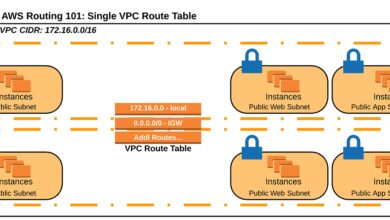AWS Jobs: 7 Ultimate Career Paths to Skyrocket Your Future
Looking for high-demand, future-proof careers? AWS jobs are your golden ticket. With cloud computing dominating the tech world, Amazon Web Services leads the charge—offering powerful, well-paid roles that blend innovation with real-world impact.
AWS Jobs: The Rising Demand in the Cloud Era

The global shift to cloud infrastructure has made AWS jobs some of the most sought-after positions in tech. As businesses migrate from on-premise servers to scalable, secure, and cost-effective cloud solutions, Amazon Web Services—powering over 32% of the global cloud market—has become the backbone of digital transformation.
Why AWS Dominates the Cloud Market
Amazon Web Services launched in 2006 and quickly outpaced competitors like Microsoft Azure and Google Cloud Platform. Its first-mover advantage, vast service portfolio (over 200 services), and global infrastructure give it unmatched reach. According to Gartner, AWS held a 31% share of the IaaS market in 2022—more than its two closest rivals combined.
- Global presence with 33 Availability Zones across 12 geographic regions
- Trusted by enterprises like Netflix, Airbnb, and the U.S. Department of Defense
- Continuous innovation with new services launched every quarter
How Cloud Adoption Fuels AWS Job Growth
Organizations across industries—from healthcare to finance—are embracing cloud technology to improve agility, reduce costs, and scale rapidly. This surge in adoption directly translates into explosive demand for AWS-skilled professionals. A 2023 report by LinkedIn listed AWS as the #1 most in-demand hard skill worldwide.
“The cloud isn’t just the future—it’s the present. And AWS is where the action is.” — TechCrunch, 2023
Top 7 In-Demand AWS Jobs in 2024
With over 1 million AWS-related job postings on LinkedIn and Indeed in the past year alone, the variety and specialization of AWS jobs continue to expand. Below are the seven most impactful and high-growth roles shaping the cloud landscape.
1. AWS Solutions Architect
Solutions Architects design and deploy scalable, secure, and reliable applications on AWS. They work closely with clients or internal teams to translate business needs into technical cloud architectures.
- Median salary: $135,000 – $160,000 (U.S.)
- Top certifications: AWS Certified Solutions Architect – Associate & Professional
- Key skills: VPC, EC2, S3, CloudFormation, cost optimization
These professionals are often the bridge between business stakeholders and technical teams, ensuring cloud solutions align with strategic goals.
2. AWS DevOps Engineer
DevOps Engineers automate infrastructure, streamline deployments, and ensure continuous integration and delivery (CI/CD) pipelines run smoothly on AWS.
- Median salary: $120,000 – $150,000
- Top tools: AWS CodePipeline, CodeBuild, CloudFormation, Terraform, Jenkins
- Key skills: Infrastructure as Code (IaC), monitoring, scripting (Python, Bash)
They play a critical role in reducing deployment times and improving system reliability—making them indispensable in agile environments.
3. AWS Cloud Administrator
Cloud Administrators manage day-to-day operations of AWS environments, including user access, security policies, backups, and performance monitoring.
- Median salary: $90,000 – $115,000
- Key services: IAM, CloudTrail, CloudWatch, S3 lifecycle policies
- Top certification: AWS Certified SysOps Administrator – Associate
They ensure systems run efficiently and securely, often serving as the first line of defense against misconfigurations and downtime.
4. AWS Security Specialist
With cyber threats on the rise, AWS Security Specialists protect cloud environments using encryption, identity management, threat detection, and compliance frameworks.
- Median salary: $130,000 – $170,000
- Key tools: AWS Shield, WAF, GuardDuty, KMS, IAM policies
- Top certification: AWS Certified Security – Specialty
These experts help organizations meet regulatory standards like HIPAA, GDPR, and SOC 2—making them vital for enterprise clients.
5. AWS Data Engineer
Data Engineers build and maintain data pipelines that collect, transform, and load (ETL) data into analytics platforms using AWS services like Redshift, Glue, and Kinesis.
- Median salary: $110,000 – $140,000
- Key skills: SQL, Python, Spark, Lambda, S3, DynamoDB
- Top certification: AWS Certified Data Analytics – Specialty
They enable data-driven decision-making by ensuring clean, accessible data is available for analysts and machine learning models.
6. AWS Machine Learning Engineer
ML Engineers leverage AWS SageMaker, Rekognition, and Comprehend to build, train, and deploy AI models at scale.
- Median salary: $140,000 – $180,000
- Key skills: Python, TensorFlow, PyTorch, SageMaker Pipelines
- Top certification: AWS Certified Machine Learning – Specialty
These roles are at the forefront of innovation, powering chatbots, recommendation engines, and predictive analytics.
7. AWS Support Engineer
Support Engineers troubleshoot technical issues for AWS customers, providing expert guidance on best practices, performance tuning, and architecture reviews.
- Median salary: $100,000 – $130,000
- Key skills: Linux/Windows OS, networking, debugging, customer communication
- Top certification: AWS Certified Developer – Associate
They serve as the frontline technical support for AWS users, often working directly with enterprise clients to resolve complex issues.
How to Get Started with AWS Jobs: A Step-by-Step Guide
Breaking into the world of AWS jobs doesn’t require a computer science degree—though it helps. What matters most is hands-on experience, certifications, and a structured learning path.
Step 1: Build Foundational IT Knowledge
Before diving into AWS, understand core IT concepts:
- Networking (IP addressing, DNS, firewalls)
- Operating systems (Linux and Windows)
- Basic scripting (Bash, PowerShell, Python)
- Security fundamentals (encryption, access control)
Free resources like Coursera’s Computer Networking course or edX’s Introduction to Linux can help build this foundation.
Step 2: Learn AWS Core Services
Start with the most commonly used AWS services:
- EC2 (Elastic Compute Cloud) – virtual servers
- S3 (Simple Storage Service) – object storage
- RDS (Relational Database Service) – managed databases
- VPC (Virtual Private Cloud) – network isolation
- IAM (Identity and Access Management) – security & permissions
The AWS Getting Started Guide offers free tutorials and labs to practice these services.
Step 3: Earn Your First AWS Certification
Certifications validate your skills and boost your resume. Start with:
- AWS Certified Cloud Practitioner: Ideal for beginners. Covers cloud concepts, AWS services, security, and pricing.
- AWS Certified Solutions Architect – Associate: More technical. Focuses on designing distributed systems on AWS.
According to CBT Nuggets’ 2023 Salary Survey, certified professionals earn 25% more than non-certified peers.
Step 4: Gain Hands-On Experience
Nothing beats real-world practice. Ways to gain experience:
- Create a personal AWS account (use the Free Tier to avoid costs)
- Deploy a website using S3 and CloudFront
- Set up a virtual server with EC2 and secure it with IAM and Security Groups
- Automate tasks using Lambda and CloudWatch Events
Document your projects on GitHub and include them in your portfolio.
Step 5: Apply for Entry-Level AWS Jobs
Look for roles like:
- Cloud Support Associate
- Junior DevOps Engineer
- IT Administrator with AWS exposure
- Technical Support Engineer
Companies like Accenture, Deloitte, and IBM often hire entry-level talent and provide AWS training on the job.
Essential AWS Certifications for Career Advancement
Certifications are a proven way to stand out in the competitive AWS jobs market. AWS offers a tiered certification path from foundational to expert levels.
Foundational Level: AWS Certified Cloud Practitioner
This is the entry point for anyone new to AWS.
- Exam cost: $100
- Prerequisites: None (but 6 months of AWS experience recommended)
- Topics: Cloud concepts, security, architecture, billing
It’s ideal for non-technical roles like sales, project management, or finance professionals who need AWS literacy.
Associate Level Certifications
There are three main associate-level certs:
- AWS Certified Solutions Architect – Associate: Most popular. Validates ability to design scalable systems.
- AWS Certified Developer – Associate: Focuses on coding and deploying apps on AWS.
- AWS Certified SysOps Administrator – Associate: Covers deployment, management, and operations on AWS.
Each requires hands-on experience and deep knowledge of core services.
Professional & Specialty Certifications
For advanced roles, consider:
- AWS Certified Solutions Architect – Professional: For senior architects. Includes complex multi-account scenarios.
- AWS Certified DevOps Engineer – Professional: Validates automation and CI/CD expertise.
- AWS Certified Security – Specialty: For cloud security experts.
- AWS Certified Machine Learning – Specialty: For AI/ML practitioners.
These are challenging but highly respected in the industry.
Where to Find AWS Jobs: Top Platforms and Strategies
Knowing where to look can make all the difference in landing your dream AWS job.
Top Job Boards for AWS Jobs
Use specialized platforms that list cloud-focused roles:
- LinkedIn Jobs: Use filters like “AWS”, “Cloud Engineer”, “Solutions Architect”
- Indeed: Search for “AWS” + your desired role
- AWS Partner Careers: Lists jobs at AWS consulting partners
- AngelList: Great for startups using AWS
- Dice: Tech-specific job board with strong AWS presence
Leverage AWS Communities and Events
Networking can open doors:
- Join AWS User Groups (meetups, online forums)
- Attend AWS re:Invent or local AWS Summits
- Participate in AWS Academy or AWS Training programs
Many jobs are filled through referrals—being active in the community increases your visibility.
Optimize Your Resume for AWS Jobs
Recruiters scan resumes for keywords. Include:
- Specific AWS services used (e.g., EC2, S3, Lambda, CloudFormation)
- Certifications (list full names: AWS Certified Solutions Architect – Associate)
- Quantifiable achievements (e.g., “Reduced cloud costs by 30% using S3 lifecycle policies”)
- Project highlights with GitHub links
Use the Jobscan tool to match your resume against job descriptions.
Remote AWS Jobs: The Future of Cloud Careers
The rise of remote work has made AWS jobs more accessible than ever. Companies no longer require physical presence, allowing talent from anywhere to contribute.
Benefits of Remote AWS Jobs
- Work from anywhere in the world
- Flexible schedules and better work-life balance
- Access to global companies without relocation
- Lower overhead costs for employers
According to FlexJobs, 65% of tech professionals prefer remote roles, and AWS skills are among the most remote-friendly.
Top Companies Hiring Remote AWS Professionals
- Amazon: Offers remote AWS support, architecture, and engineering roles
- Accenture: Global cloud consulting with remote cloud architect positions
- GitLab: Fully remote DevOps and cloud engineers
- Automattic (WordPress.com): Uses AWS extensively; hires remote cloud admins
- Netflix: Remote-friendly culture for cloud infrastructure teams
Always verify remote policies during the interview process.
How to Succeed in a Remote AWS Role
- Master communication tools (Slack, Zoom, Jira)
- Be proactive in updates and documentation
- Use version control (Git) religiously
- Maintain a dedicated, distraction-free workspace
- Stay updated via AWS blogs, webinars, and podcasts
Remote success hinges on self-discipline and clear communication.
Future Trends Shaping AWS Jobs
The cloud landscape is evolving rapidly. Staying ahead of trends ensures long-term career relevance in AWS jobs.
AI and Machine Learning Integration
AWS is embedding AI into its services. SageMaker, Bedrock, and CodeWhisperer are making AI accessible to developers. Future AWS jobs will increasingly require AI literacy—even for non-ML roles.
“Every developer will be an AI developer in five years.” — Matt Wood, VP of AI at AWS
Serverless and Event-Driven Architectures
Services like Lambda, API Gateway, and EventBridge are reducing the need for server management. AWS jobs are shifting toward designing event-driven, auto-scaling systems that minimize operational overhead.
Multi-Cloud and Hybrid Environments
While AWS dominates, many enterprises use multiple clouds (AWS + Azure + GCP). Future AWS professionals must understand interoperability, data portability, and cross-cloud security.
Sustainability and Green Cloud Computing
AWS aims for 100% renewable energy by 2025. Future roles may involve optimizing cloud workloads for energy efficiency and carbon footprint reduction—emerging as a niche but growing field.
Edge Computing with AWS Wavelength and Outposts
For low-latency applications (IoT, 5G, AR/VR), AWS is expanding to the edge. Jobs in edge infrastructure, deployment, and monitoring are on the rise.
What are the most in-demand AWS jobs?
The most in-demand AWS jobs include AWS Solutions Architect, DevOps Engineer, Cloud Administrator, Security Specialist, and Data Engineer. These roles are critical for deploying, securing, and scaling cloud infrastructure.
Do I need a degree to get an AWS job?
No, a degree is not mandatory. Many AWS professionals enter the field through certifications, hands-on labs, and project experience. Employers value skills and certifications over formal education.
How much do AWS jobs pay?
Salaries vary by role and experience. Entry-level AWS jobs start around $80,000, while senior roles like Solutions Architect or ML Engineer can exceed $180,000. Certifications can boost earnings by 20-25%.
Are AWS certifications worth it?
Yes, AWS certifications are highly valuable. They validate your expertise, improve job prospects, and often lead to higher salaries. The Cloud Practitioner and Solutions Architect certifications are especially respected.
Can I get an AWS job with no experience?
Yes, but you’ll need to demonstrate skills through certifications, personal projects, and labs. Start with entry-level roles like Cloud Support or Junior DevOps, and grow from there.
The world of AWS jobs is dynamic, rewarding, and full of opportunity. Whether you’re just starting or looking to level up, the demand for cloud expertise is only growing. By mastering core services, earning certifications, gaining hands-on experience, and staying ahead of trends, you can build a future-proof career in the cloud. The journey may be challenging, but the rewards—financial, professional, and intellectual—are immense. Start today, and become part of the force shaping the digital future.
Further Reading:









